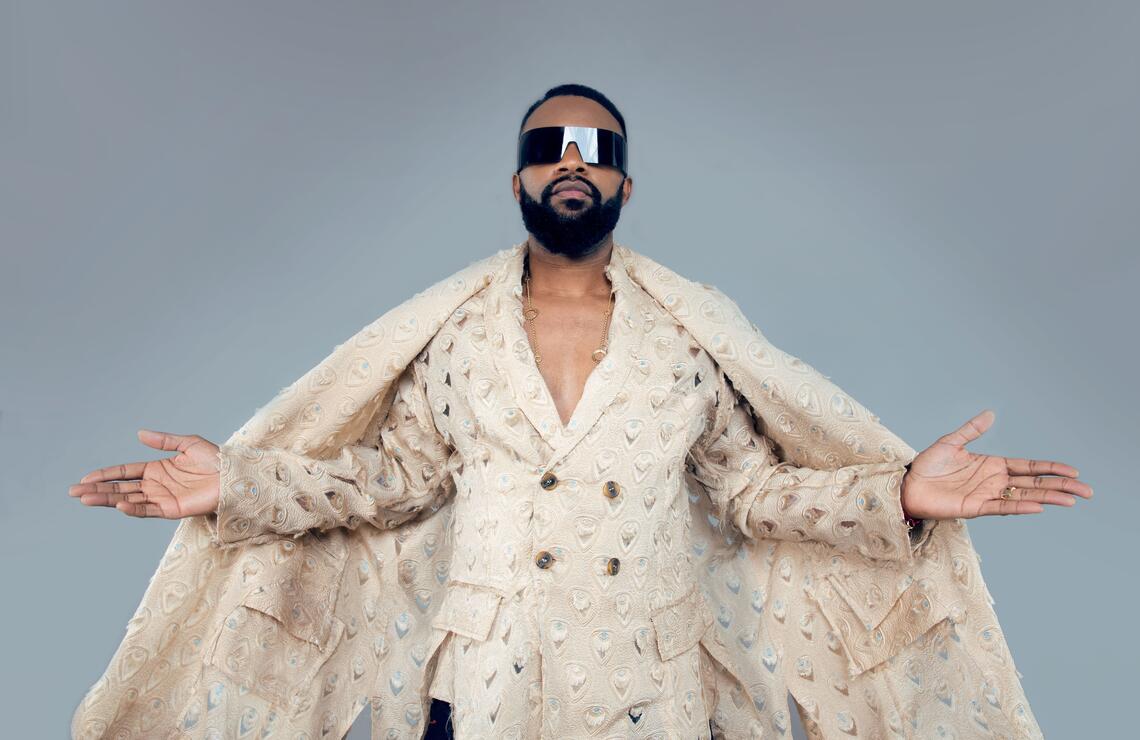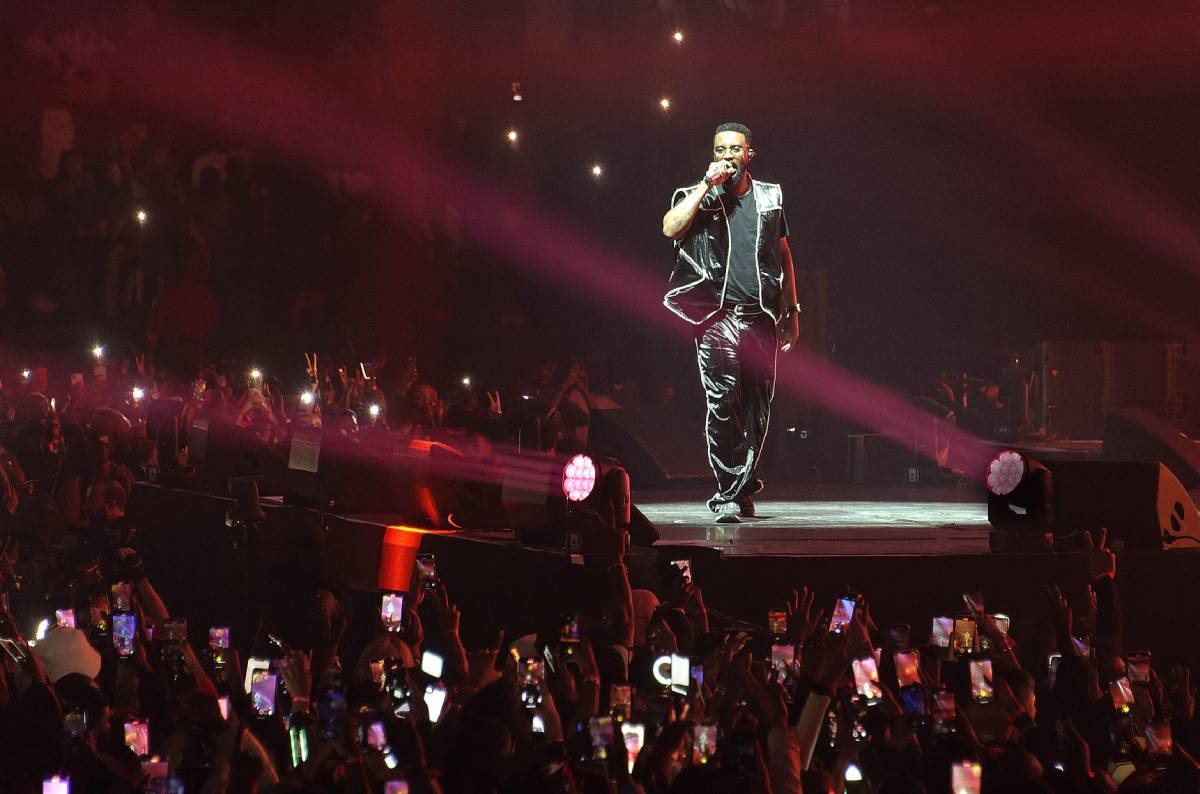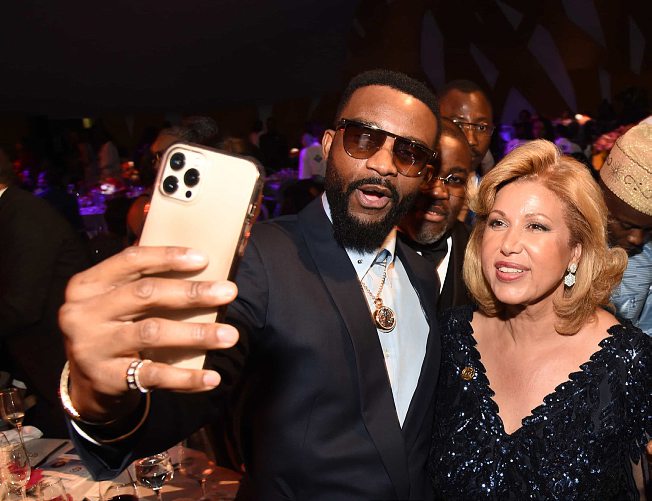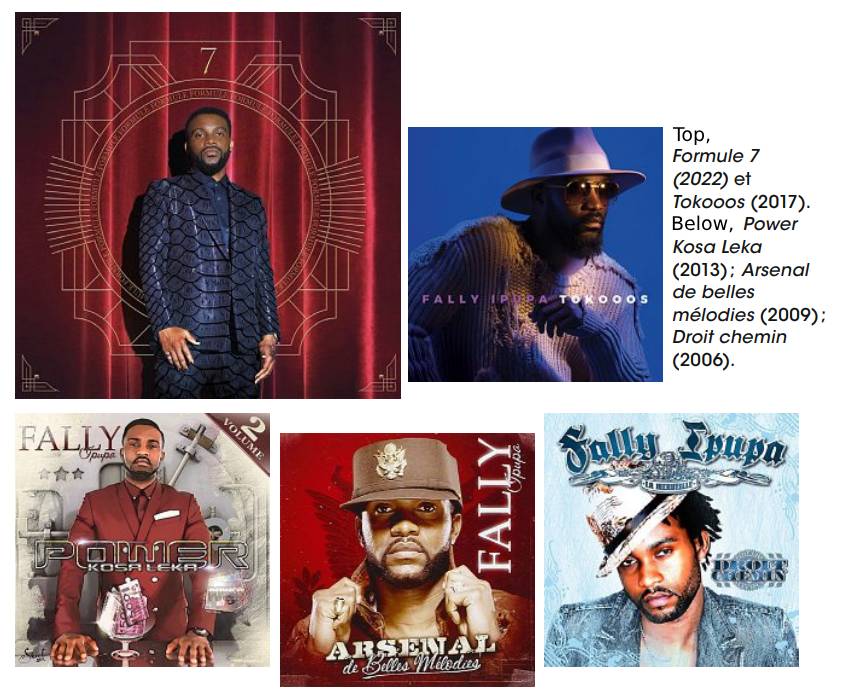
Fally Ipupa :
Planetary stardom
He has become one of the biggest names in Congolese rumba, an ultra-competitive and often brutal musical sphere. By combining tradition and modernity and inventing his own style, DiCap la Merveille has conquered not only his country and Africa, but also a large part of the world. Portrait of a world-class singer.
This child of Kinshasa, born Faustin Ipupa Nsimba, used to sing in schools and churches. With his smooth voice, swaying body and often enigmatic attitude, he was spotted by the legendary Koffi Olomidé and joined the equally famous Quartier Latin, before making the brave decision to leave. Going under the name Fally Ipupa, aka DiCap la Merveille, aka L'Aigle, he went on to conquer ‘Congo Kin’, Africa and then the world. At the age of 46, he is clearly at the top of his game in the competitive – and sometimes violent – world of Congolese rumba and its business.

His latest offering, Formule 7, released at the end of 2022, was a smash hit. With 31 tracks ( yes, 31!) spread over a triple album, the opus is described as a veritable celebration of Congolese rumba, pure Fally all the way. Tracks like ‘Mayday’, ‘Marlène’, ‘De La Renta’ and ‘Afsana’ have got people dancing all over Africa, and way beyond. The numbers are equally impressive, with the album racking up over 120 million views on the music platforms. And it's also the first Congolese rumba album to be certified gold for export by the SNEP, France's national syndicate of phonographic publishing. The album was followed by a memorable tour of the United States and France, including a massive concert at the Paris La Défense Arena on 25 November 2023, playing to a 40,000-strong audience. The artist controls the album's longevity and its marketing, producing quality videos as the months go by – the latest, ‘Alliance’, was released in March 2024. “I prefer to be the guide rather than the follower”, he admitted before the concert at La Défense.
However, Fally's fame didn't start with Formule 7. He'd already sold-out Bercy stadium performing with Koffi Olomidé and Quartier Latin. In 2006, he went solo. And in 2007, he became the first Congolese artist of his generation to play to a full house at the Olympia (Paris). Ten years later, his fourth album, Tokooos, went gold. Yet another first for a singer from the DRC. Clearly, the kid from Kinshasa has ambition and talent. And a certain kind of courage. Because success doesn't come without setbacks. The Congolese music scene is notorious for its sometimes brutal rivalries. Fally has not been spared. Koffi Olomidé took exception to being abandoned by his ‘young son’. The rivalry became fierce, exacerbated by DiCap la Merveille's growing popularity and his ambition to come out from under his master's shadow. For years, their heated exchanges via the media provided fodder for the Congolese celebrity press. He has also crossed swords with other big names, including Ferre Gola, his former Quartier Latin band mate. The quarrels and personal insults were amplified and fuelled by social media, with fans on both sides challenging each other and mobilising. These rivalries, practically inherent to rumba, help to build the characters and their legends. Paradoxically, they also help to energise the music scene. Indeed, every artist is constantly seeking to outdo themselves, to innovate, with the aim of beating the competition, to the great benefit of the public and creativity. Fally Ipupa is perhaps the most talented and skillful of them all.
He reads trends, scans his market, identifies the intersection between the old and the new. The Congo reigns, but it has to face up to the emergence of formidable contemporary sounds, with afrobeats, coupé-décalé, afropop and afrotrap. Artists have to reach out to new generations. And Fally's strength lies in his ability to pull it all together. He works on his roots, on classical rumba too, while opening up to the modern world. One of the singer's biggest hits is ‘Eloko Oyo’, a revisited version of Congolese folklore, a cover of a song by the late Mabele Elisi, considered to be the ambassador of the Anamongo, one of the great Bantu population groups of the DRC.
THE MAJESTIC FLIGHT OF THE EAGLE
Fally, while often singing in Lingala, is aiming for the great beyond. He's from Kinshasa, it's his city, his country. He wants to take Congolese sound and culture to all corners of the globe. So he blends and mixes. He invented and imposed a style, ‘Tokooos’, a word he made up, derived from the Lingala word ‘kitoko’, which means ‘beautiful' and 'positive’. It's Congolese urban music that draws on the history, streets and alleys of Kinshasa, while connecting with new sounds from Lagos, Abidjan, Dakar and even American hip-hop. Adding a healthy dose of showmanship on stage and in his music videos, he often invokes the language of love in his suave voice, the language of beautiful stories, sad stories, the language of seduction and betrayal.
In short, in twenty years he has gone from being Koffi Olomidé's young protégé to international superstar. Capable of seducing African and non-African audiences alike. Alongside France's duke Booba, diva Aya Nakamura, afrotrap master MHD and his friend and Nigerian afropop legend Wizkid, he transcends genres with ease, breaking down the doors of the music industry to propel the Congo, and by extension Africa, to centre stage.
A consummate showman, he exudes an opulent style. Never without his shades and always with a sharp sense of fashion, he cultivates his image. He also has a particular fondness for luxury watches, sometimes studded with diamonds. When he started out as a kid in Kinshasa, he didn't dream of being a superstar or becoming super-rich; he wanted trainers and a car. His passion for trainers remains. His passion for cars, too. For his first solo video, the artist used a Bentley Continental, his favourite model. His garage now boasts two of them. His smartphone is an essential work tool, whether he's on the ground, on a plane or on the move. He dictates his notes, his thoughts, writes his songs, stores music, his albums, sounds that inspire him. And the phone is also stylish. He loves headgear and berets, particularly those from a leading Italian fashion house. He has launched a streetwear brand, ‘Attitude’, track pants and T-shirts that he wears himself. Fashion magazines pay attention to him, and he can regularly be seen at haute couture shows, particularly in Paris. And even when it comes to fashion, the singer is the talk of the town. Some see him as a trendsetter, while others feel that his more recent recourse to the big brands has killed off the daring style of his early years.

Singer, businessman, fashionista... Fally is also trying to break away from the stereotypical image of the Congolese rumba baron. The persona he has built for himself is one of social involvement. He participates, defends and represents his country. In 2012, Barack Obama invited him to be part of the Young African Leaders Initiative. He was invited to the United States-Africa summit in December 2022, attended by DRC's President Félix Tshisekedi. He met President Joe Biden at a gala dinner in Washington. He talks to others, like Albert II of Monaco. In February 2022, he met Paul Kagame at a lunch at the Senegalese presidency (along with other famous African musicians). The two men shook hands, Fally maintaining a certain reserve. There's a photo. And a torrent of reactions on social media. Pro and anti, given the particularly complicated relations between Rwanda and the DRC. In Abidjan, he is close to First Lady Dominique Ouattara and her Children of Africa foundation. All these connections, relations, explanations and advocacy have enabled him, he says, to successfully carry out projects for the foundation that bears his name, which is active on the ground, and which celebrated its tenth anniversary on 13 April 2023 with a major concert in Kinshasa.
INTEGRITY IS KEY
Getting involved in politics can be risky. In February 2023, Fally Ipupa was invited to the Élysée Palace by Emmanuel Macron, just before the French President's tour of Central Africa. The meeting gave rise to discussions on the political situation in the country. In Kin, the climate was heated and the French President's image particularly tarnished. The day after the meeting, a car belonging to the singer and one of his homes in Kinshasa were set alight. But the Eagle did not back down. A month later, he posed with the French president again at a party in Kinshasa. The photo caused controversy, but the anger quickly died down, and Fally was able to announce new concert dates at the famous Martyrs stadium.

The artist says it over and over again: he does not campaign for anyone or support anyone. He wants to make an impact, to get things moving, particularly in the DRC. Nevertheless, when a star gets too political, he becomes a factor, and sometimes a target. For years, Fally Ipupa has been in the crosshairs of the ‘combattants’ (fighters) – a nebulous group of radical Congolese opponents from the diaspora with complex affiliations, who accuse him and other Congolese stars of colluding with the government. In 2017, his concert at La Cigale was cancelled by the Paris police because of the risk of demonstrations. Three years later, in February 2020, his concert at the Accor Arena in Bercy sparked violent clashes and a spectacular fire at the Gare de Lyon, a stone's throw from the venue. It was a major blow to the international image of Congolese rumba. It was also a very special concert, held at a time when the Covid epidemic was taking hold, and will go down in history as one of the very last major public events before the virus imposed a lockdown on the whole of France (and elsewhere). But Fally did not give in to the pressure from the ‘combattants’. In an interview with French monthly Jeune Afrique, on the eve of the major concert on 25 November 2023, he maintained: “I have friends who are fighters, but real ones, not people who call themselves ‘combattants’ claim to be fighters for their own interests, who use fighting as a business”, he said. “I don't respect them. I respect the real fighters who advocate for peace in Congo and Africa.”
The committed singer is therefore maintaining his concerts, his programmes and his actions. He was a panellist at the Global Africa Business Initiative (GABI) conference at the Unstoppable Africa event, held from 25 to 26 September on the sidelines of the 79th meeting of the United Nations General Assembly in New York. Organised by GABI, the event ran in parallel with the Future Summit organised by the United Nations. Fally also took part in Africa Day, a day of discussion and debate held in Paris on 3 October. He is also gearing up for a tour of France, with dates in Marseille, Lille and Nantes at the end of the year. And, no doubt, he is also writing and working on new material for his next album. Always striving to stay at the top. The most difficult position, where you have to hang tight, constantly reinventing yourself, making sure to stay relevant, to keep your place.